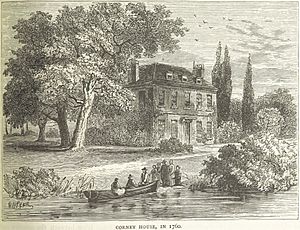Charles Rouse-Boughton facts for kids
Sir Charles William Rouse Boughton (born December 1747 – died 26 February 1821) was an important person who worked in India for a big British trading company called the East India Company. Later, he became a member of the British Parliament, representing areas like Evesham and Bramber.
Contents
Biography
Early Life and Work in India
Charles was the second son of Shuckburgh Boughton and Mary Greville. He went to India in 1765 to work for the East India Company. This company was very powerful and traded goods, but also governed large parts of India.
He held many different jobs there. He worked as a translator for the Persian language. He was also a senior trader and even a judge. While he was in India, he inherited a large property called Rouse Lench in Worcestershire, England.
Returning to England and Parliament
Charles left the East India Company and came back to England in 1778. In 1780, he decided to run for a seat in Parliament, which is where laws are made for the country. He was elected for Evesham after a tough election.
His main focus in politics was India. All the speeches he made between 1780 and 1790 were about Indian affairs. In 1784, he became the Secretary to the Board of Control for India. This was an important role in managing British affairs in India. He held this job until 1791. He also spoke against the impeachment of Warren Hastings, who was another important British official in India facing a big trial.
Later Life and New Titles
Charles did not run for election in 1790 and left Parliament for a while. In 1791, he officially changed his name to Rouse. He was also given the title of 1st Baronet Boughton Rouse. A baronet is a special title, like a knight, that can be passed down in the family.
In 1794, he inherited another title, becoming the 9th Baronet of Langford. At this point, he changed his last name again to Rouse Boughton.
He returned to Parliament in 1796 for a place called Bramber. Bramber was known as a "Rotten borough". This meant very few people lived there and had the right to vote. Often, just a couple of landowners controlled who got elected. In this new Parliament, Charles again spoke several times about India.
He left his seat in Parliament in 1800. He was then appointed an Audit Commissioner. This meant he helped check government spending. He held this job until he passed away in 1821.
Family
In 1781, Charles married Catherine Pearce. Catherine inherited large properties near Ludlow, including Downton Hall. This was very helpful for Charles and his family. Catherine also improved the Downton estate by planting a beautiful area called High Grove, or Catherine's Grove. A famous painter named Romney painted her portrait in 1785.
Charles was very interested in farming. He was even known for having a remarkable pig! In London, he lived at a house called Corney House in Chiswick.
Charles's son, William, inherited his baronet title. His daughter, Louise (1785 – 9 July 1860), married twice. First, she married St Andrew St John, 14th Baron St John of Bletso. Later, she married Sir John Vaughan.
In the TV show Who Do You Think You Are? (which aired on BBC2 in 2010), the comedian Alexander Armstrong found out that his mother is a descendant of Louise through her first marriage to Baron St John.
 | James B. Knighten |
 | Azellia White |
 | Willa Brown |


